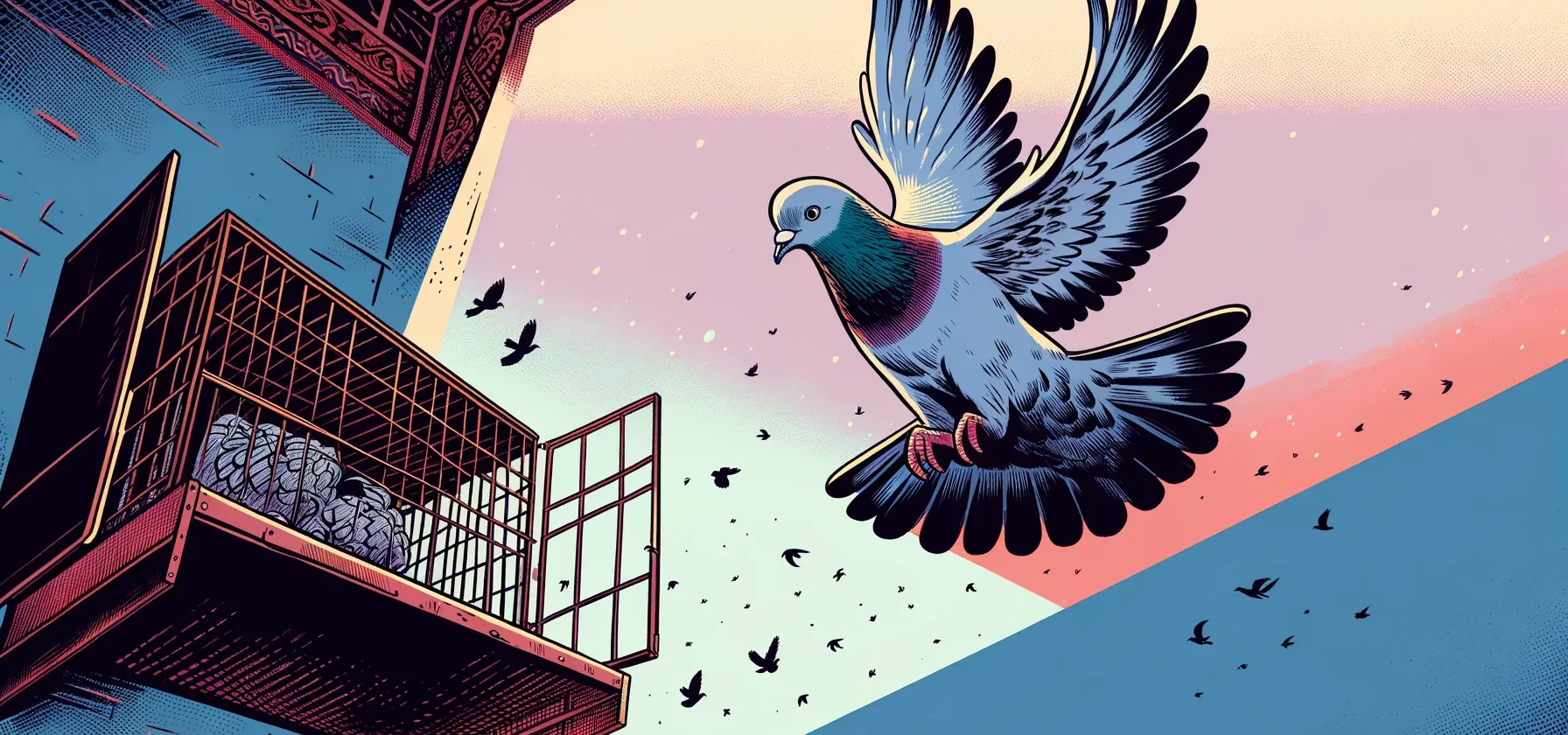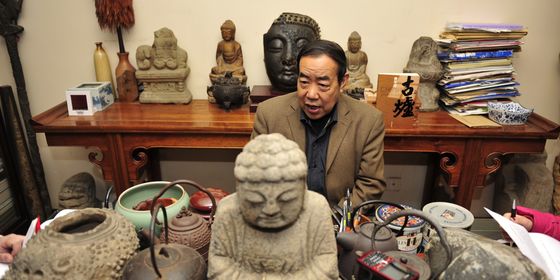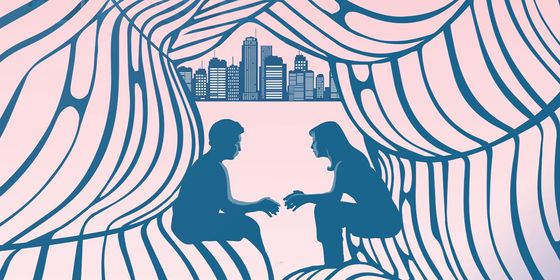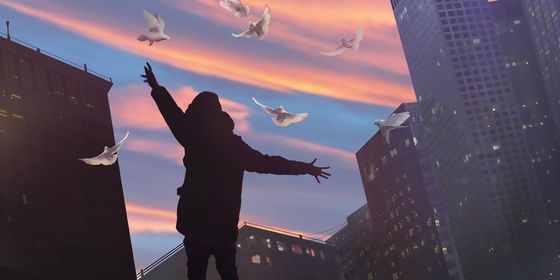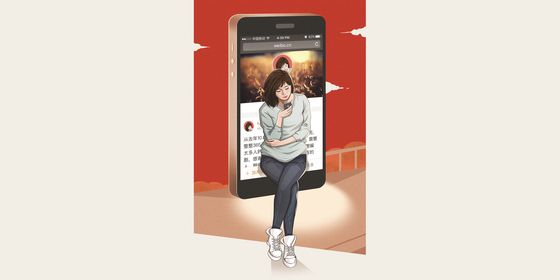A mother and daughter's life is transformed by the unlikely arrival of a boy, a man, and a pigeon
1
The first time I brought Zhuo Ran home was last year in February. I didn’t let my mother know beforehand, nor did I know how to tell her. One morning, I simply asked: “I’d like to bring a friend home in a day or two; could you manage to be back at noon?” My mother was kneeling on the floor, scraping and washing unscrupulously.
Without hesitation, she replied: “No, with the Spring Festival coming, I’m busy at the store.”
At the time, she was working in a private photo studio, helping with photo cutting, lighting, storekeeping, and cleaning. Ever since her early retirement, she redirected most of her energy to the studio, but I still haven’t found any tangible, deep connection between her and photography. She enjoys being photographed though, and has kept numerous self-portraits from different periods and photographers. Some were taken by art fans in the factory’s labor union, some by young men in the neighboring workshop, some by distant relatives, and some by the backbone of the culture and arts unit she became acquainted with during the Down to the Countryside Movement. She claims these photos were taken for me to look at so that I wouldn’t miss her too much when she passed away. However, it seems that such preparation had been going on for a long time—ever since she was a teenage girl.
Back then, there were no coloring techniques; photos could only be printed the size of a fingernail. Still, she glued all these small pictures into a photo album, one by one, marking the date, location, photographer, the clothes she wore, and their colors. When I asked her about the whereabouts of the photographers, she muttered vague replies and seemed to be at a loss. But when it came to anecdotes of when the photos were taken, or how to strike a pose, she could be extremely talkative. Even though she can’t even turn on a digital camera—and is almost completely unaware of Photoshop—those images and experiences became a significant part of her life.
She replied so resolutely that I didn’t want to throw her off of her work, so I had to tell Zhuo Ran: “Perhaps you can come in the evening. My mother is too busy. I’m afraid we can only treat you to a simple meal.” Zhuo Ran acquiesced, simply replying that he would need to inform his parents that the plan to visit my house had changed from noon to evening. Sometimes I wished he would say more, but he never took that cue. A good conformist and follower, he is like a well-behaved, tongue-tied little boy.
“Oh, about the money, have you spoken to her?”
I couldn’t see Zhuo Ran’s expression over the phone, but my heart pulsed with complicated emotions—not a good feeling, but not an extremely bad one.
“Qingqing, if you don’t have money, I could give you some. My mother will be comforted and gain face if your mother gives me some money. Then, maybe she will like you,” Zhuo Ran added.
I shouldn’t have been blamed for neglecting this issue. I had been looking for an opportunity to break it to my mother. But, for some reason, the words just stuck in my throat like a fishbone. In my family, my mother and I have only each other, but we are on two different planets, each following its orbit. Only in rare moments do we share some warmth. I don’t offer painstaking reports or converse deeply with her, nor do I ask her for advice. As such, she rarely asks after me. This seems different from Zhuo Ran’s family or, rather, any healthy family.
I had already dined twice with Zhuo Ran’s family behind my mother’s back. His family exercises the straightforwardness found in typical Shanghainese, blunt and without pretense. But from start to finish, Zhuo Ran’s mother never said a word to me. His father appeared more amiable and asked about my family.
“Why not let Zhuo Ran visit?” His father asked.
“What’s the point?” I thought, but I said, “Next time.”
“You know,” eyeing the chopsticks in my hand, his father continued, “even if your family lives in the slums, you should let Zhuo Ran visit.”
I then realized, in this family, next to each plate lay a pair of serving chopsticks.
2
“Who is this friend?” Mother asked me.
“My boyfriend,” I answered.
I was helping her clear away tableware when she blurted out the question but froze upon answering. She asked: “Oh, then why is he coming? Marriage proposal?”
“Not exactly,” I laughed. “Actually, I am not sure why either. Just think of it as him casually hanging out with us.”
My mother took a long and meaningful look at me and jeered lightheartedly: “No wonder you haven’t been paying attention to me recently, turns out you are soon to be married!”
“No, not at all!” I swiftly denied. “Don’t talk gibberish—not this soon.”
“Soon is not bad; either way it’s a good thing.” She sidled up to the stove and gestured for me to clean up the table, seemingly not having taken my words seriously. I felt temporarily reassured. Zhuo Ran and I met in middle school. From a secret relationship at school to a public one later; from the endless confusion to the increased humdrum of daily trifles—all the grievances and melancholy—I never tried to share it with my mother. I didn’t know how. But I did know that, regardless of my decisions, my mother would always respect me. She only wished for my happiness.
“Qingqing, it’s time to prepare. But, when your friend gets here, do you want to come in the store and have a picture taken? I can ask Uncle Lin to take a photo of you both together,” my mother said, as she came into the living room with a plate of apples.
“A wedding photo?” I asked playfully.
“No, of course not!” she said, immediately and forcefully denying just as I had earlier, “How could this kind of wedding photo be presentable? Your Uncle Lin’s workshop is tiny. We can’t have others looking down on you. But in truth, those studios with ‘Parisian’ and ‘Milanese’ in their names are not as good as your Uncle Lin’s. He still uses film, really brilliant, complicated, technical stuff that truly captures the depth of people. You young people wouldn’t understand.”
I suddenly gathered my courage and asked: “Mom, could you prepare 2,000 kuai to give to Zhuo Ran?”
“What? Why?” She was startled.
To be honest, I didn’t know why either.
“Maybe he will be happy. It shows that you like him,” I answered with false composure.
“I haven’t even met him, how could I know if I like him or not? Didn’t you say that he is only coming to hang out?”
“Qingqing, what is going on? Tell your mother the truth,” My mother suddenly tensed up, which made me anxious.
“Are you having a…?” She closed in like Mei Shiping from Thunderstorm—ghastly.
“Nonsense! Of course not. If you don’t want to, so be it. It’s nothing serious. I knew you would say no. I don’t see the point either; giving him money is pointless. But I am in a difficult position, mom, I hate it too!” For some reason, with these words, I grew agitated. But I knew this agitation would end badly. So, I turned around and went into my room, cutting the conversation short. For an instant, I was almost overcome with the impulse to cry, but I soon calmed myself. What would be the point?
Luckily, she didn’t bother me the whole night. All went as before, each of us on our own planet with our own worries.
3
The next day, when I woke, there was an envelope on the table with 2,000 kuai; it was heavy in my hand. Underneath it lay a note with oddly written characters: “Mom has money.” It was neatly written—and heartbreaking. I have money; Zhuo Ran has money as well—a lot of money. But he insisted that this 2,000 yuan would have insurmountable significance on his mother. After some deliberation, I put the money back in my mother’s drawer.
Zhuo Ran arrived at dusk, holding a paper bag labeled “Oriental Shopping Mall.” When I asked what it held, he answered: “Clothes my mom bought for your mother, a 3,000 kuai cashmere sweater—half off.”
“Anything for my dad? Or you just decided you wouldn’t bother?” I asked.
He looked ill at ease and at a loss. “I thought they were no longer together,” he said with a shaky voice.
“He’s still my dad and not dead,” I replied gruffly.
“Right, right, right. I will make up for it later. Please don’t be mad…I am visiting your home, you should be happy,” Zhuo Ran said in an attempt to appease.
Happy.
I hadn’t been happy for a long time, in fact; I constantly felt an invisible weight on my shoulders. When Zhuo Ran was busy looking around the house, I poured him a cup of hot water, wanting to turn on the heat, but not enough to look for the remote. He coughed twice, and I pretended not to hear it. Faked fragility, a little cold isn’t fatal. I really didn’t want to give him the special treatment, the money, or even the heating. Watching him drinking water and shivering, I handed him a rubber hot-water bag: “This is what I use, very warm.”
“Thank you,” he said politely, looking at me timidly. I hadn’t seen him so cordial in a while. Such gratitude aroused my sympathy.
When my mother returned, Zhuo Ran and I went to the door to greet her together. This grand gesture gave her a start.
“Sit, sit, sit, go sit,” she blurted out without even looking at Zhuo Ran. Zhuo Ran was transfixed and then smiled. I guess my mother was shy; after all, I’d never brought a boyfriend home before.
My mother said: “There’s another guest coming, just in time to have a meal together. I bought a lot of good things!”
“Someone’s coming?” I thought to myself. Now, that was rare.
“Who is it?” asked Zhuo Ran.
I had no idea either. Zhuo Ran walked around my house with light steps, leafing through my books absentmindedly. He also scrutinized our furniture and photos; most, of course, were displays of my mother’s youth. There’s not even one picture of me on display. Old family photos seemed to contain an extra person we avoided carefully. In all the pictures my mother and I took together, I looked glum and dull while she seemed in high spirits. Therefore, only the images of her youth were on display in our house, with mine nowhere to be found.
My mother asked me to help wash the vegetables. After cleaning the green onions and slicing the ginger, I finally asked her who else was coming.
Mother said, mysteriously: “This afternoon, a pigeon walked over to our photo studio door. It was thrilling. It stood resolutely in front of our door and pondered for a long, long time. Taking two steps forward, then two steps back, two steps forward, it finally walked into the shop in the end. I thought it must have been too exhausted to fly, so I grabbed it and tied its feet. Tonight, your Uncle Lin will come to kill it. It just so happened that you had a friend coming as well.” She said all this proudly as if she had won a battle. The poor pigeon, with feet tied tight, was thrown into the water basin.
“I love pigeon meat,” Zhuo Ran chimed in. “Stewed pigeon tastes even better with some dried scallops, Chinese angelica, and dangshen (poor man’s ginseng)!”
4
When Uncle Lin came through the door, the startling thirst for blood in his eyes frightened me. He saw me and smiled, saying: “Qingqing, where’s the pigeon?” Zhuo Ran laughed out loud, recognizing the sardonic savagery in Uncle Lin’s words.
“In the kitchen, I can’t bear looking at it. Are you going to kill it now?” I asked.
“Yes, I will bring it to you for a last look. Ha-ha! Oh right, this must be Zhuo Ran?”
I really did not expect that Zhuo Ran would meet Uncle Lin so soon. I was going to bring Lin up later, to delay Zhuo Ran’s report to his family. Uncle Lin is the owner of the photo studio, and my mother works at his studio now. The two of them so naturally entwined is a wonderful thing. I had known Uncle Lin for quite a while. More precisely and conspicuously, it was before my father left; we met at my grandfather’s funeral. My mother asked him for a family photo shoot. He smiled at me, zooming in and out with the lens. I could not see his eyes, but I felt that his smile embodied a threat. Alongside the funeral music, it gave me chills down my spine.
He was not a bad person. If it wasn’t for him being the one who drove my father away, I would have believed that he was a perfectly amiable middle-aged man.
Zhuo Ran didn’t know what to do with this sudden change in events, but his confusion held both curiosity and excitement. I hated his excitement; he could always so easily display his best side to me, and I constantly had to expose the parts I least wanted. Perhaps that was how marriage was supposed to work: no veil, two people, completely naked, aside from the alarming defects of forgivable imperfections.
Uncle Lin took the pigeon to the courtyard and untied the string. It collapsed feebly on the ground, having lost all strength.
“Give it something to eat,” I said. “That poor creature, so pretty too.”
“If it were ugly, you wouldn’t mind, would you? It’s just a pigeon, good for your health,” Zhuo Ran said.
“Humph, so you haven’t had enough of those dried scallops, Chinese angelica, and dangshen? This is a life. It hasn’t done anything wrong!” I found myself getting quite upset.
Zhuo Ran stared, dazed, not uttering a word. He quietly entwined his fingers with mine. All of a sudden, my heart melted. I was more anxious, nervous, and uneasy than upset. He was innocent in this after all. Who isn’t?
“It is a homing pigeon,” said Uncle Lin. “Its feet have words written on them. Must have traveled a long way, a good pigeon.”
By then, delicious smells wafted up from the kitchen. My mother had started to prepare her best dish, the eggplant clay pot with braised yellow croaker. The rich scent of soy sauce almost brought back childhood memories. It had been so long since the house bustled with so many people. It was as if I were in a dream. I could either relive it or look forward to it—such a lovely four-member household and simple family happiness.
“Uncle Lin,” I beckoned. “Let it go.”
5
This dinner made mother quite nervous. She was not yet ready to chat. Perhaps that was why she suddenly wanted Uncle Lin to be present. It made me feel awkward as well. Uncle Lin kept the pigeon in the courtyard. As we ate our soy-sauce-rich dinner, it kept on pecking rice, drinking water, and cooing, which caused a bit of a stir. My mother, though, hadn’t quite given up and kept nagging: “Why aren’t we eating such a good pigeon?” Zhuo Ran, on the other hand, kept praising my kindness—obvious flattery.
Uncle Lin said to Zhuo Ran: “Qingqing has quite a temper; her moods are so changeable. But, she means well. I watched her grow up. She is very sensitive. Be patient with her as much as you can.”
Zhuo Ran kept nodding, and even my mother nodded along.
Mother asked Zhuo Ran: “Is it good?” And she put a chopstick-full in his bowl.
I became irritated: “He can eat by himself, no need to help him.”
“It’s all right,” Zhuo Ran said politely.
Hatefully, I thought of the “serving” chopsticks. “Good?” I asked.
But to me, Zhuo Ran’s answer would not make a difference. “Uncle Lin is a good person; we’ve been friends for a long time. You should be nice to Uncle Lin from now on,” I told Zhuo Ran in a dull voice, while keeping my head down, avoiding his gaze.
After night fell, as my mother tidied up and chopped fruits, Zhuo Ran, Uncle Lin, and I watched television and played a round of poker. I never anticipated the three of us sitting together, but everything seemed so pleasant, cozy, and full of life. Such a rare occasion, yet illusory. Somehow, I felt that this would be the first time and the last time. All beautiful things are veiled and transitory.
“Looking at you youngsters makes me feel old,” said Uncle Lin. “You still have a wonderful youth and a wonderful life ahead. All is well.”
“Uncle Lin, how old are you?” asked Zhuo Ran.
“This year happens to be the Chinese Zodiac Year for Qingqing and me, so I’m…12 years older than her,” Uncle Lin answered in a flash.
“Wha—”
“It’s 24 years,” I corrected him.
“Oh, ha! My mistake. Old age has addled my wits,” Uncle Lin laughed. My mother overheard our conversation and entered in earnest. She tapped Uncle Lin’s shoulder with a wet finger.
“Oh, right!” Uncle Lin looked at my mother and then at us apologetically. He told Zhuo Ran: “Qingqing’s mother only has Qingqing, and I have no children of my own. I have always treated her as my own daughter. Her mother means—”
6
The homing pigeon stayed with us for several days; Uncle Lin phoned the Homing Pigeon Association, but he could not find anyone to adopt it. Bizarrely, pigeon keepers rejected our wishes to give it away, perhaps afraid that our true intention was a high price. Neighbors coming and going at the studio all expressed doubt at our decision to send the pigeon away; though, some expressed interest in it purely as dinner. Uncle Lin refused them all. In the end, he made up his mind to keep it, perhaps in an attempt to please me and my bitter heart. He even ventured to the pet market and bought a massive pigeon case. However, after spending his first day with it, someone called and wanted to take it.
Uncle Lin asked mother about my opinion. I said: “Give it away.”
So, the pigeon case ended up at my place, empty as it stood in the courtyard. Once it bustled with life, once it was full, but that seemed like a distant hallucination.
As for the heated argument that night, neither of us mentioned it later.
My mother wanted to move out of our house to live with Uncle Lin, so I could sell it and buy a place with Zhuo Ran. What Zhuo Ran had in mind, in line with his parents’ wishes, was for me to live with his family and accept my house as the dowry. All I wanted was to keep the house—the house my father had lived in. Even just one more day would be worth it.
Zhuo Ran’s father said to me on the phone: “I thought that girls in your condition would cherish the opportunity to marry into a family like ours.” At that moment, I realized I still had a responsibility to protect my family, just like Zhuo Ran’s family protected him.
My mother told me: “Besides the house, I have nothing to offer you. I am sorry, and I owe it to your father, too. But I don’t want you to feel poor, because we all love you. Be with the person you love, that has nothing to do with money or a house. We don’t have great means, but that can change.”
“You have to be with who you love as well. Don’t do it for me; do it for yourself,” I said to my mother.
“Qingqing, mom has money,” she added, musing.
But I really could not bear hearing these three words. These three words were the most ear-piercing and heart-wrenching words in the whole world. Every time she uttered these three words, I felt like I could give up everything in my life. No romantic love could heal this scar in my heart.
After the Spring Festival, Uncle Lin and my mother got their wedding certificate. It was a day with heavy snow, a good omen. I praised my mother as the “bride in the snow.” Her smile was shy, yet moving. I had never seen her so shy, never a smile like that.
I took their wedding photo. In Uncle Lin’s studio, the three of us set up lights together. I was like a photographer in an old film, ordering them “to the left, to the right, a little closer, smile!”
Also, I used film, complicated, technical stuff. Later, I managed to hang the photo on the wall along with all the other photos in our house—that is after some fiddling and reordering. There really was no room for this pair of newlyweds.
Fortunately, an auspicious snowfall promises a fruitful year.
Author’s Note
This story originates from the scene “bringing the boyfriend home for the first time.” Personal relations in a cold world are the most common, yet most difficult, subject to depict, especially when you still want to maintain the warmth of life and the peaceful visage of the characters while their hearts boil. That is similar to this short story, which ultimately is warm and blissful.





